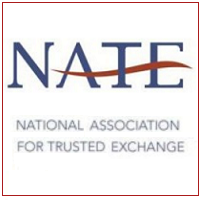 The National Association for Trusted Exchange (NATE) welcomed the Health Record Banking Alliance (HRBA) as its newest association member. HRBA is a non-profit organization founded in 2006 to promote consumer-centered, consumer-controlled, comprehensive, lifetime electronic health records.
The National Association for Trusted Exchange (NATE) welcomed the Health Record Banking Alliance (HRBA) as its newest association member. HRBA is a non-profit organization founded in 2006 to promote consumer-centered, consumer-controlled, comprehensive, lifetime electronic health records.
The Health Record Banking Alliance advocates for a consumer-centered, unified, lifetime electronic health record. After consumers visit a healthcare provider, they should request that their provider send a copy of their visit summary to an account that they have established with a trusted private repository. Over time, this will become a comprehensive record of each consumer’s care, which they can make available, at their option, to providers, family members, and even medical researchers if they so choose. HRBA believes that a single reconciled account of all of a consumer’s health records will promote safer, more effective, and less expensive care while giving the consumer peace of mind about who is looking at their medical records.
“NATE and the Health Record Banking Alliance agree on a core principle. Consumers are healthier when they are actively engaged in their care but they can’t be successful if their data isn’t all in one place,” said Aaron Seib, NATE CEO. “We are very excited to welcome HRBA as a NATE member. Together we can accelerate progress on behalf of patients across the nation.”
“HRBA and NATE are trying to bring about the same end,” said Richard Gibson, MD, PhD, Executive Director of the Health Record Banking Alliance. “Both of our organizations are dedicated to giving consumers access to and control over their entire health record because it improves outcomes. We’re looking forward to working together to achieve our shared goals.”
The National Association for Trusted Exchange (NATE) is a not-for-profit membership association focused on enabling trusted exchange among organizations and individuals with differing regulatory environments and exchange preferences. Like-minded stakeholders are invited to visit this website for additional information.
About National Association for Trusted Exchange
The National Association for Trusted Exchange (NATE) is a not-for-profit membership association focused on enabling trusted exchange among organizations and individuals with differing regulatory environments and exchange preferences. NATE brings the expertise of its membership and other stakeholders together to find common solutions that optimize the appropriate exchange of health information for greater gains in technology adoption and improvement of patient outcomes. Consistent with NATE’s mission to address the legal, policy and technical barriers that inhibit health information exchange between data holders and healthcare consumers, NATE leads and participates in a number of ongoing and emerging projects focused on exchange via multiple modes of transport, including Direct secure messaging and APIs. NATE’s Blue Button for Consumers (NBB4C) Trust Bundle provides a technical solution to establishing scalable trust among organizations using Direct secure messaging to exchange protected health information between HIPAA covered entities and the consumers that they serve. The NBB4C includes the trust anchors of multiple consumer-facing applications (CFAs) that have elected to adopt a common set of policies and practices that enable consumer mediated health information exchange while upholding personal privacy preferences. Stakeholders interested in participating in NATE’s work to support consumer mediated exchange should consider NATE membership or subscribe to News from NATE on the NATE website.
About Health Record Banking Alliance
Health Record Banking Alliance (HRBA) is a 501(c)(6) non-profit organization of leading healthcare information technology professionals and organizations dedicated to promoting and supporting the development of health record banks. Today, whenever a person seeks care, a record is left behind. Until now, there hasn’t been a secure, unified location to store these records so that they can all be used to help guide one’s care. At the time of care, one gives permission for a healthcare professional to access some or all of the consumer’s up-to-date health records via a secure connection. When care is complete, the new records from that visit are securely deposited—and made available for the future.
